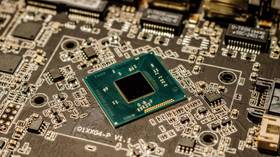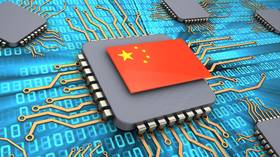China launches push for tech supremacy

The Chinese government has turned to domestic tech companies in a drive to become ‘self-reliant’ and has also set a goal for the country to take the global lead in the production of microprocessors.
In a push to become a “technology superpower,” China’s ruling Communist Party aims to turn its three-year-old chip unit, T-Head, into a designer of processor chips with the means to support its domestic semiconductor needs.
T-Head already unveiled its third processor – the Yitian 710 for Alibaba’s cloud computing business – in October, and was cited by MarketWatch as saying that it currently has no plans to export the chip to other countries. Its first chip, the Hanguang 800, designed for artificial intelligence, was unveiled in 2019. The second, the XuanTie 910, was intended for self-driving cars.
Apart from T-Head, China’s other tech moguls, including games and social media giant Tencent and smartphone maker Xiaomi, are also planning to invest billions to support official government plans to make the people’s republic self-reliant in terms of chip production.
China currently accounts for 23% of global semiconductor output, but only 7.6% of sales.While Chinese factories assemble a variety of the world’s tech products, it is highly dependent on technology from the US, Europe, Japan, Taiwan and South Korea. Chips make up China’s biggest import, topping even crude oil and accounting for more than $300 billion last year. Beijing wants to end this dependence, particularly after China’s first global tech brand Huawei was cut off from US technology in 2018 under Washington’s sanctions.
“Self-reliance is the foundation for the Chinese nation,” President Xi Jinping said earlier this year, calling for China to become a “technology superpower” to safeguard “national economic security.”
Processor chips are crucial for making products like smartphones, home appliances and vehicles. Shortages have been plaguing global chip manufacturing for the past year due to Covid-19, resulting in production delays and factory closures.
For more stories on economy & finance visit RT's business section













